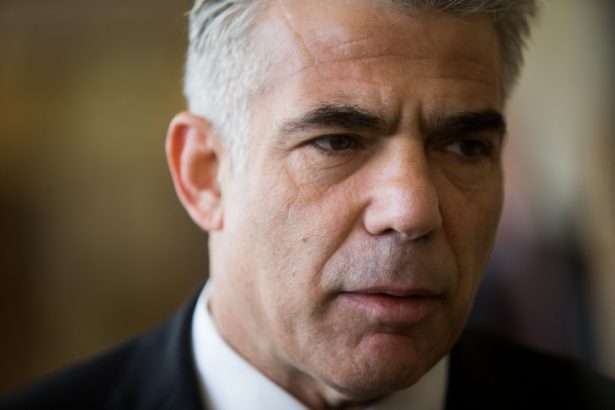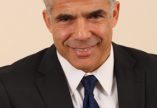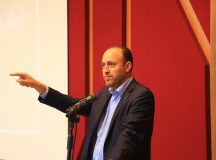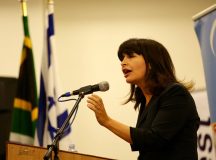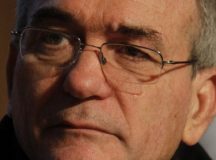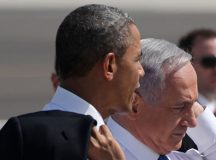According to the latest polls, Yesh Atid leader Yair Lapid is Israel’s most liked politician after the Prime Minister. In this exclusive interview with Fathom, he talks about Trump’s withdrawal from the Iran deal, prospects for restarting peace talks, and why he believes centrist politics still holds the key to Israel’s future security as a Jewish and democratic state.
Fathom: What are your thoughts on the JCPOA nuclear agreement and US President Donald Trump’s decision to withdraw from it?
Yair Lapid: I believed the JCPOA was a bad agreement and needed to be fixed. But I thought it was worth giving ourselves another chance to try to recreate the international coalition that pressured Iran to negotiate in the first place. If you listen to what French President Emmanuel Macron, German Chancellor Angela Merkel and UK Foreign Secretary Boris Johnson were saying during their trips to the US, there was a feeling that an opening exists to create to more comprehensive agreement which will deal with Iran’s ballistic missile programme, its support for the proliferation of terrorism and eliminate the sunset provisions of the JCPOA. We need to make sure that the Iranians will never be able to return to a nuclear weapons programme. I thought it would have been good to give ourselves six months at most to see if there was a possibility of a coalition. But I was not disappointed in what Trump did because it was better than choosing to do nothing. If you cannot build a coalition then you have to go unilaterally and work to convince players to join afterwards.
Nobody – including the Americans – has said Iran is breaching the JCPOA at the moment, but if you look at the kind of lies and deceit from before, as well as the secret Iranian nuclear archives Prime Minister Benjamin Netanyahu presented, you understand they are going to lie and cheat at the first opportunity and the fact there is such a weak agreement relating to supervision is a huge problem.
During the pre-JCPOA period the sanctions were working and this is part of the reason why Trump withdrew, to renew pressure on the Iranian regime to talk and to negotiate a new agreement. Right now the Iranians are vulnerable to sanctions. Their currency, the rial is trading on approximately 40,000 to $1 on the official market (and around 60,000 to $1 on the black market). Tehran was also using the sanctions relief money to build an army in Syria than helping their own people.
The big question will be how to get to a new agreement and clearly the president feels the best way is to start unilaterally, believing in the power of conviction.
Another challenge is US involvement in the Middle East in general, which is in decline, and this raises the question as to whether Trump has the leverage to bring about a new deal? I think the president’s decision to take US troops out of Syria is not the right move. The Middle East needs the US to be involved. Russia is becoming the hegemonic power in Syria – they have their own interest to protect. The future role of the US is going to part of future discussions we have with them, there is always room for disagreement and improvement even with close friends.
Fathom: In Syria, what is the best way for Israel to counter Iran? There is a belief that a Israel-Iran war over Syria is inevitable and therefore it is better for Israel to fight one now than wait till Iran is more entrenched and prepared. Are you in favour of waiting to see if Tehran can be rollback in Syria or is it the time for preventative strikes?
YL: We are living in a world where there is no clear line between peacetime and wartime. According to Valery Gerasimov’s military doctrine [Gerasimov is the current Russian Chief of Staff) there is no such thing as conventional war, only hybrid war, which is what we have now in Syria. Iran started this confrontation by moving into Syria, knowing exactly what kind of threat this poses for us and the reaction they would likely face. One of their aims is for a pier in the Tartus harbour. Can you imagine a situation in which there are Russian, Israeli and Iranian submarines all within a few square miles of one another? And the idea of Iranian Revolutionary Guard Corps on our northern border is intolerable for us.
With Hezbollah – which is an extension of Iran – we have been following their developments and ensuring that nothing happens which militarily empowers them. Whilst we need to have a constant effort to reduce the threat, I wouldn’t advise an all-out-war if it is preventable. Sometimes you are faced with scenarios that require taking action but Israel’s best interest is to avoid war if possible. Golda Meir said once, ‘If the Arabs laid down their weapons there would be peace and if the Jews laid down their weapons there would be massacres’ – this is the basic principle we live by.
Over the last seven years we have realised that the international community won’t come to our aid on this issue, so we have to make sure that Iran understands that we are going to protect ourselves no matter what. Because what we refer to as the ‘civilised world’ seems to be civilised when something terrible happens in Europe but not when it happens to Syrian children. Excuse me for getting angry about this; it’s the Holocaust survivor’s son in me.
Fathom: On domestic politics. In these times of polarities and extremes, how do you in Yesh Atid create space for centrist politics?
YL: First of all, Yesh Atid is doing ok. A few months ago I was leading in the polls, now I’m second to the prime minister. And over the last two years we’ve been running head to head. So there are enough people listening to the voice of reason. But it is not just an Israeli problem. I remember discussing with French President Macron before the French election, ‘How can you convince people that responsible and sane is worth their vote?’
Like many other democracies, the traditional battleground between Left and Right is no longer relevant, and now it’s between people who just say crazy stuff on both sides and those who are sane in the centre.
While these are shared concerns amongst many centrist parties, Israel has specific challenges because, like in many other things, the country is like any other but on steroids. The discourse we have in Israel has become a huge issue. People are looking at each other saying do we really want to go on like this, with this type of rhetoric.
The issues that used to divide the Left and Right have changed too. For example, the traditional difference between the Left and Right was the Palestinian issue. Is it not the main issue anymore. A prominent Israeli journalist, Ben Caspit, wrote that Prime Minister Netanyahu and myself say similar things – two-state solution, security in our hands and no division of Jerusalem but that the reason Netanyahu is considered right-wing and I am considered a centrist is because people believe me when I say it.
I speak at a lot of town hall meetings of over 800 people and often you get only one or two questions on the Palestinian issue. Most of the conversion is taken up with how to protect democracy from those who try to undermine it. So we are also dealing with issues that others in the world are dealing with.
Tony Blair has spoken about how debates often cross traditional Left/Right lines and focus more on whether society should be open or closed. Yet Israel is slightly different because we don’t deal with the issue that really preoccupies Europe and other areas which is globalisation. If you look at the two recent revolutions that have influenced world politics – globalisation and technology – they are not controversial issues in Israel. Everybody knows and understands that the more global Israel is the better Israel will be and we understand ourselves as the innovation nation, that is the source of our strength.
Fathom: Given the current impasses of the peace process and the situation in Gaza, if you were Prime Minister today would you have a different approach with the Palestinians? And what are your thoughts on President Trump’s Embassy move?
YL: I think the move of the American embassy to Jerusalem and the full recognition of Jerusalem as the capital of Israel is a great day. And I call upon the entire world to move their embassies to Jerusalem. It’s the holy city, is the capital of Israel – and has been for the last 3,000 years – and I see this step as just recognising reality, history, and what is just.
On Gaza I’ve been saying for quite a while now that Israel needs to fight Hamas terror as forcefully as possible. Ultimately no country would allow hundreds of terrorists violating its territorial integrity.
We do everything we can to avoid the killing of innocents. When I was a member of the security cabinet during Operation Protective Edge in 2014 we spent more time discussing how to avoid civilian casualties than we did on military operations. It’s not a cliché to say that we are heartbroken when Israel mistakenly kills a Palestinian. I wish the world media would spend more time discussing the concept of ‘human shield’ and the use of children by Hamas. Perhaps this isn’t done because it’s so difficult for them to digest.
But on a strategic level Israel needs to create a gap between the people of Gaza and the terror organisation running Gaza, and to do this you have to help the people get electricity, medicine and the ability to support themselves. There is a dispute inside Israel whether or not this approach would aid Hamas. This is definitely a risk, but I believe it’s a risk worth taking. We may need to raise the military pressure on Hamas, but at the same time, we have no interest in having a humanitarian crisis in Gaza, neither as human beings nor as a strategy.
On the broader issues about the Palestinians, I was involved in the negotiating team in the former government, which was the 11th round of bilateral negotiations since the Oslo Accords. It was a little despairing to listen to tired people saying the same tiring things to each other. Instead, it is time for a regional approach – to hold a regional conference with the Saudis – and Crown Prince Mohammed Bin Salman is an interesting figure – the Egyptians and the Gulf countries (with the exception of Qatar) in order to create the mechanism for negotiations. Initially we’ll probably work on a partial agreement; it will have to be step by step. But not to do anything about the Palestinian issue is to me irresponsible. Right now we’re passing our biggest problem to our children.
During my time in the government I had an interesting conversation with Netanyahu about the concept of a regional conference. He said to me that you don’t put the leaders in the room if you don’t know what the end result is already, if it hasn’t all been worked out. So I said, ‘Why do you need leaders then?’ Leadership is not about facing the enemy but about telling your own people the things that are difficult to hear, that is the hardest part of leadership.

